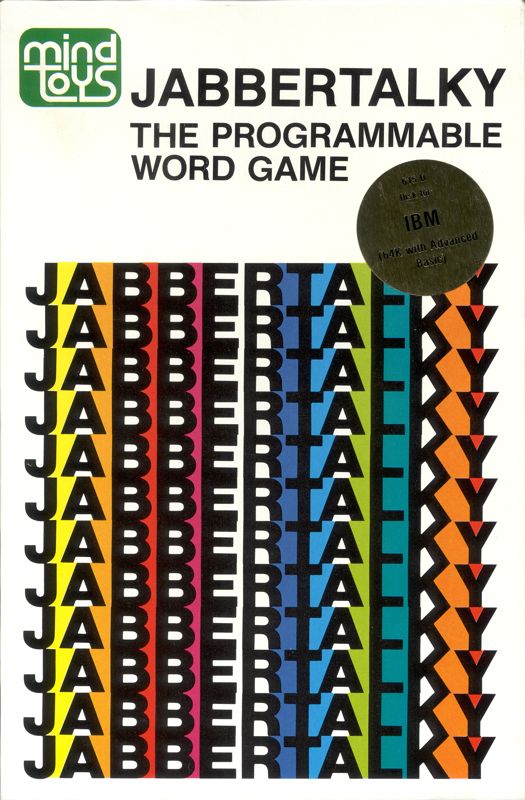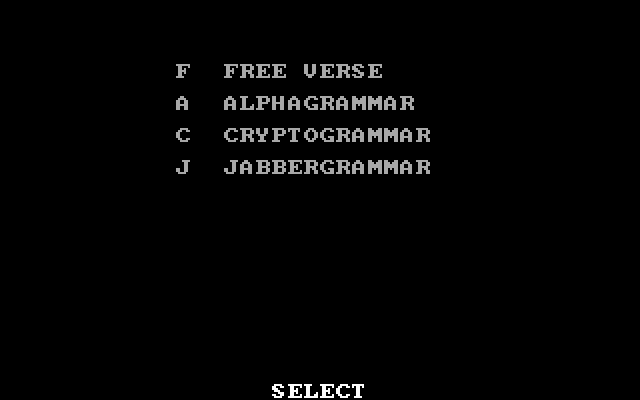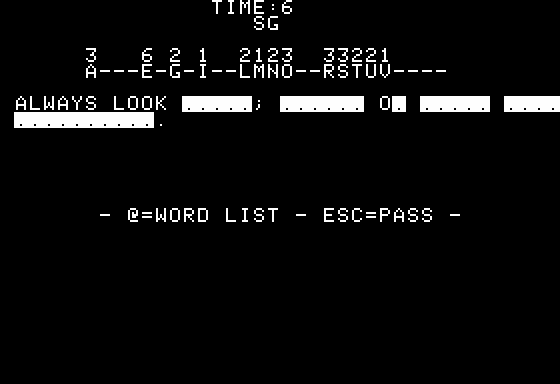Retro Replay Review
Gameplay
Jabbertalky delivers a thoughtful mix of educational puzzle mechanics and replayability, offering four distinct modes—Free Verse, Alphagrammar, Cryptogrammar, and Jabbergrammar—that cater to both solo and group play. With eight levels of difficulty for each mode, players can ease into the more accessible puzzles or challenge themselves with advanced sentence-construction riddles. Whether you’re a casual word-game enthusiast or a seasoned puzzle solver, the scalable difficulty and multiple modes ensure there’s always a fresh challenge awaiting.
(HEY YOU!! We hope you enjoy! We try not to run ads. So basically, this is a very expensive hobby running this site. Please consider joining us for updates, forums, and more. Network w/ us to make some cash or friends while retro gaming, and you can win some free retro games for posting. Okay, carry on 👍)
In Free Verse, the game displays computer-generated sentences drawn from your custom vocabulary or the built-in word lists. This non-interactive mode serves as an introductory showcase, giving you a preview of sentence complexity and length before diving into the more hands-on puzzle modes. It’s an excellent calibration tool for setting expectations and fine-tuning difficulty, especially if you plan to play with varying skill levels in a group.
Alphagrammar tasks you with reconstructing a hidden sentence using alphabet clues. The game shows empty spaces for each letter and enumerates the frequency of every character at the top of the screen. This mode emphasizes pattern recognition, vocabulary recall, and speed; the faster you match letters to spaces, the higher your personal bests climb. It’s deceptively simple at lower levels but grows fiendishly complex as you progress.
Meanwhile, Cryptogrammar offers a classic substitution-puzzle experience. You’ll see a jumbled sentence where each letter is swapped for another, and you must swap, flip, or relocate letters until the phrase reads correctly. This mode demands both linguistic intuition and strategic trial-and-error, making it a standout for players who enjoy deeper deductive challenges. Finally, Jabbergrammar empowers you to craft your own word lists and vocab sets, tailoring every puzzle to specific themes or difficulty tiers. The combination of customization and eight-level scaling ensures Jabbertalky remains fresh even after dozens of sessions.
Graphics
Jabbertalky’s visual presentation is clean and utilitarian, prioritizing clarity over flashy visuals. The interface uses high-contrast text on a neutral background, ensuring every letter and clue is instantly legible. This is especially important in modes like Alphagrammar and Cryptogrammar, where reading accuracy is paramount—and the game never disappoints on that front.
Menus and navigation screens are minimalistic but thoughtfully organized. Icons for each mode are simple yet distinctive, helping players quickly switch between Free Verse previews and the full puzzle suite. Animations are subtle: letters slide or flip into place with concise feedback sounds, adding tactile satisfaction without distracting from the core challenge.
Color palettes and typography remain consistent throughout all eight difficulty levels, which is helpful for players who rely on muscle memory during rapid letter placement. While there’s limited graphical flair, the streamlined aesthetic serves the educational focus, keeping eyes trained on the wordplay rather than decorative distractions.
Story
Jabbertalky doesn’t offer a traditional narrative but instead weaves its own “story” through progressive learning and mastery. Each puzzle solved feels like a small victory, and as you unlock higher levels of difficulty, you gain a sense of academic achievement akin to advancing through a language course. The game’s pacing mimics a classroom syllabus, with Free Verse at the fore and more complex modes introducing advanced grammar and cryptography concepts.
The absence of characters or plot threads is intentional, placing the emphasis squarely on words and linguistics. In multiplayer sessions, however, a shared camaraderie emerges as friends or family members race to decode sentences. These emergent social stories—who solves the hardest puzzle first, who customizes the wackiest word list via Jabbergrammar—add a personal narrative layer that many players find engaging.
Customization through Jabbergrammar further deepens the game’s implicit storyline by letting you tailor puzzles to your own vocabulary themes: favorite movie quotes, insider references among coworkers, or specialized jargon for educational use. This adaptive content acts like a user-driven subplot, ensuring that the game’s “story” evolves with your interests and keeps you invested over time.
Overall Experience
Jabbertalky stands out as an educational puzzle game that balances accessibility and depth with remarkable finesse. Its four distinct modes, each featuring eight difficulty levels, accommodate a wide spectrum of players—from young learners solidifying basic vocabulary to seasoned puzzle fans craving cryptographic challenges. Multiplayer support enhances its value, turning solitary brain teasers into competitive or cooperative social play.
The game’s design philosophy—prioritizing clear typography, intuitive controls, and scalable difficulty—makes every mode approachable yet endlessly replayable. While the graphics are intentionally minimal, this restraint directs full attention to the central appeal: word puzzles. By focusing on the gameplay rather than aesthetic frills, Jabbertalky ensures that every letter counts.
In the end, Jabbertalky offers a polished, educationally rich package that feels both purposeful and fun. It’s an excellent purchase for families, classrooms, or individuals looking to refine their language skills. With customizable word lists, robust difficulty scaling, and multiple modes to explore, this game provides not only hours of engaging play but also genuine cognitive benefits—a combination that’s hard to beat in the puzzle genre.
 Retro Replay Retro Replay gaming reviews, news, emulation, geek stuff and more!
Retro Replay Retro Replay gaming reviews, news, emulation, geek stuff and more!









Reviews
There are no reviews yet.